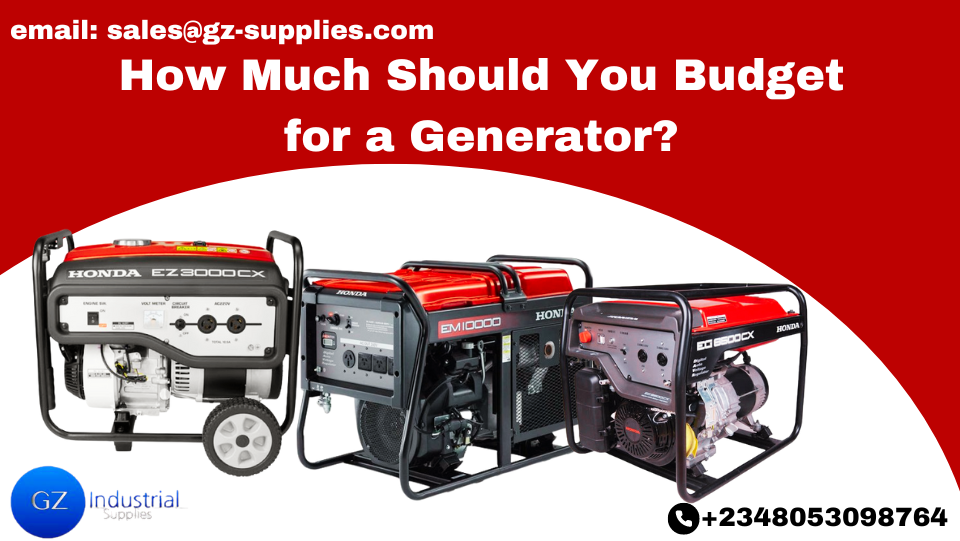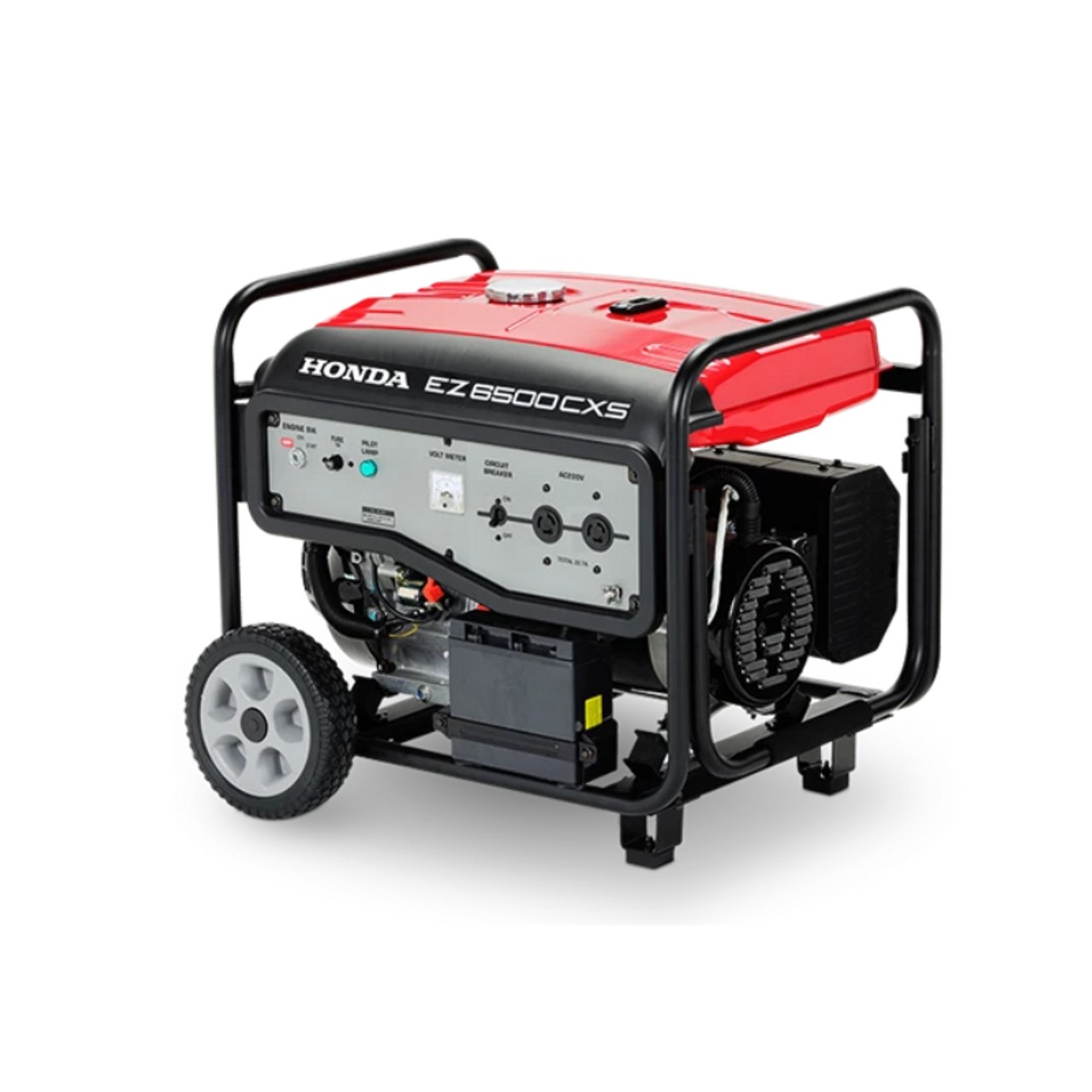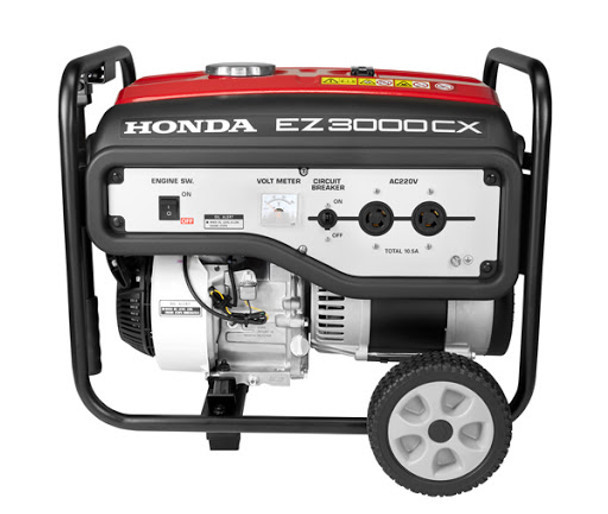How Much Should You Budget for a Generator? Price Breakdown
Key takeaway
In Nigeria where uninterrupted power supply is crucial for both residential and commercial operations, investing in a generator is often a necessity rather than a luxury. However, determining how much to budget for a generator can be a challenging task, especially with the wide range of options available in the market.
One effective approach to determining how much to budget for a generator is to conduct a thorough assessment of your power needs and priorities. Begin by evaluating the essential appliances, equipment, and systems that require power during outages, as well as any additional items you may want to power for comfort or convenience. Consider factors such as wattage requirements, runtime expectations, and potential future expansions or upgrades. Next, research different generator models and their corresponding prices, taking into account factors like power output, fuel type, features, and brand reputation. Once you have a clear understanding of your requirements and the available options, you can develop a budget that aligns with your needs and financial capabilities. Remember to factor in not only the upfront cost of the generator but also any additional expenses such as installation, maintenance, fuel, and accessories. By taking a comprehensive approach to budgeting for a generator, you can make a well-informed decision and ensure that you invest in a reliable power solution that meets your needs.
This comprehensive guide aims to make the process easy by providing a detailed breakdown of generator prices, factors influencing these prices, and practical tips for budgeting effectively.
Factors Affecting Generator Prices
When it comes to generator prices, several key factors play a significant role in determining the overall cost. Understanding these factors is essential for making informed decisions and budgeting effectively. Here are some of the primary factors to consider:
1. Power output capacity
The power output capacity of a generator, measured in kilowatts (kW), is one of the most significant factors influencing its price. Generally, generators with higher power output capacities command higher prices due to their ability to handle larger loads and provide more extensive coverage during power outages.
2. Fuel type and efficiency
Generators are available in various fuel types, including gasoline, diesel, natural gas, and propane. The choice of fuel type can impact not only the initial purchase price but also ongoing operating costs and maintenance requirements. Additionally, generators with higher fuel efficiency ratings typically come with higher price tags upfront but can result in long-term cost savings.
3. Brand and reputation
The brand reputation and quality of a generator manufacturer can also affect its price. Established brands with a track record of reliability and performance often command higher prices due to consumer trust and brand recognition. While opting for a reputable brand may involve a higher initial investment, it can provide peace of mind and potentially lower long-term maintenance costs.
4. Additional features and accessories
Generators come with a range of additional features and accessories designed to enhance functionality and convenience. These may include electric start capabilities, remote monitoring systems, automatic transfer switches, and weatherproof enclosures, among others. While these features can add value and convenience, they also contribute to the overall cost of the generator.
Prices of Generators
| S/N | Generator | Prices (₦) |
| 1 | Honda EZ3000 2.5 KVA | 400,000-450,000 |
| 2 | Honda EZ6500X 5KVA | 1,000,000-1,500,000 |
| 3 | Honda EG6500CXS 5KVA | 1,200,000-1,500,000 |
| 4 | Honda EM10000 | 6,000,000-7,500,000 |
Price Breakdown of Generator Components
Understanding the breakdown of generator prices involves examining the costs associated with various components and factors. Here's a closer look at the key components that contribute to the overall price of a generator:
1. Generator engine
The engine is the heart of any generator, responsible for converting fuel into electrical energy. The cost of the engine is influenced by factors such as size, power output, and fuel efficiency. High-quality engines from reputable manufacturers may command a premium price due to their reliability and performance.
2. Alternator
The alternator is another critical component of a generator, responsible for converting mechanical energy from the engine into electrical energy. The price of the alternator depends on factors such as capacity, efficiency, and construction quality. Generators with more robust and efficient alternators may come with higher price tags.
3. Control panel
The control panel houses the generator's controls, monitoring gauges, and safety features. The complexity and features of the control panel can vary widely depending on the generator model and application. Advanced control panels with digital displays, automatic voltage regulation, and remote monitoring capabilities may contribute to higher generator prices.
4. Enclosure
The enclosure, or housing, of a generator plays a crucial role in protecting the internal components from environmental factors such as weather, dust, and debris. The material, design, and construction quality of the enclosure can impact both the price and durability of the generator. Weatherproof enclosures made of durable materials such as steel or aluminum may incur higher costs.
Practical Tips for Budgeting Effectively
Now that we've explored the key factors and components influencing generator prices, let's discuss some practical tips for budgeting effectively when purchasing a generator:
1. Define your power requirements
Before shopping for a generator, determine your specific power requirements based on the appliances, equipment, or systems you need to power during outages. This will help you narrow down your options and avoid overspending on a generator with excessive capacity.
2. Research and compare prices
Take the time to research different generator models, brands, and prices to find the best value for your budget. Compare features, specifications, and customer reviews to make an informed decision. Keep in mind that the lowest-priced generator may not always offer the best quality or reliability.
3. Consider long-term costs
When budgeting for a generator, consider not only the initial purchase price but also long-term costs such as fuel, maintenance, and repairs. Opting for a more fuel-efficient generator or investing in preventive maintenance can help minimize ongoing expenses and maximize the lifespan of your generator.
4. Factor in installation and accessories
Don't forget to budget for installation costs, accessories, and any additional components you may need, such as transfer switches, fuel tanks, or soundproofing enclosures. These expenses can add up quickly and should be included in your overall budgeting considerations.
E. Plan for future expansion or upgrades
Anticipate future needs and growth when budgeting for a generator. Consider whether you may need to expand your power capacity or upgrade your generator in the future to accommodate changes in your power requirements. Investing in a scalable or modular generator system can provide flexibility and cost savings over time.
Honda Generator EM10000
Frequently Asked Questions (FAQs) About Generator Prices
Here are answers to some common questions that individuals often have when considering generator prices:
1. What factors determine the price of a generator?
Generator prices are influenced by various factors, including the generator's power output, brand reputation, fuel type, features, and construction quality. Higher-capacity generators with advanced features and superior build quality typically command higher prices.
2. Are diesel generators more expensive than gasoline generators?
In general, diesel generators tend to be more expensive than gasoline generators due to their higher efficiency, longer lifespan, and lower fuel consumption. However, the initial investment in a diesel generator may be justified by lower long-term operating costs and increased durability.
3. How can I find the best value generator for my budget?
To find the best value generator for your budget, compare multiple models based on factors such as power output, fuel efficiency, reliability, warranty coverage, and overall reputation. Consider both upfront costs and long-term operating expenses to determine the best value proposition.
4. Are there any hidden costs associated with purchasing a generator?
While the upfront cost of a generator is the most obvious expense, there may be additional hidden costs to consider, such as installation, maintenance, fuel, accessories, and potential repairs. It's essential to factor in these expenses when budgeting for a generator to avoid unexpected financial burdens down the line.
5. Can I save money by purchasing a used generator?
While purchasing a used generator may offer cost savings upfront, it's essential to carefully evaluate the condition, maintenance history, and reliability of the generator before making a purchase. Used generators may have higher maintenance requirements and shorter lifespans compared to new generators, potentially offsetting any initial cost savings.
Conclusion
Understanding generator prices requires a comprehensive analysis of various factors, including the generator's components, features, and long-term costs. By following the practical tips outlined in this guide and considering your specific power needs, budget constraints, and future growth plans, you can make a well-informed decision when purchasing a generator. Whether you're seeking a backup power solution for your home, business, or outdoor activities, investing in the right generator is crucial for ensuring reliable power supply and peace of mind.
For a wide selection of high-quality generators at competitive prices, visit GZ Industrial Supplies. Our experienced team can help you find the perfect generator to meet your needs and budget. Don't wait until the next power outage—be prepared with a reliable generator from GZ Industrial Supplies.
Contact us to explore our generator options and contact us for personalized assistance.
Recent Posts
-
The Ultimate Guide to Understanding the Difference Between Ethylene Glycol and Propylene Glycol
Introduction Glycols are versatile compounds widely used across various industries, from automotive …Apr 16, 2025 -
What are Agricultural Machinery
Introduction Agricultural Machinery is also used to improve the wide range of production prac …Apr 14, 2025 -
The Best Electrical Wire in Nigeria 2025 (Updated)
Introduction Electrical wires are the basic unit of every electrical system. Electrical wires …Apr 14, 2025










